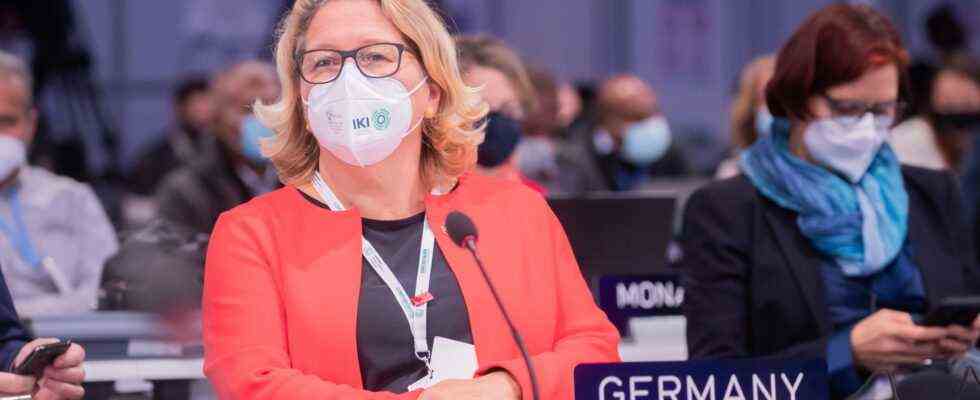Status: 11/14/2021 1:36 a.m.
The reactions to the final declaration of the climate summit are very different. Environment Minister Schulze, among others, expressed her confidence. Others rate the agreements reached far worse.
Federal Environment Ministry Svenja Schulze has recognized the results of the world climate summit. “Glasgow brings a clear acceleration for climate protection, and more speed is also required,” said the SPD politician. “The 20s are the decade in which the global community can and must make decisive progress. This conference has shown that the world is pursuing a common goal, a climate-neutral global economy.”
The end of the fossil fuel age. However, she would have liked the statements on the coal phase-out more clearly. “But the way is now mapped out and will be irreversible.” “In order to still achieve the 1.5 degree target, the world will significantly increase the frequency at which it monitors the progress of the Paris Agreement,” said the minister. “Goals are important for climate protection, but the 1.5 degree path only becomes reality if you walk it together and implement it in practice. It works with real progress in wind turbines, solar systems, power grids, charging stations, forests, moors or green steel factories. “
“We still have hard work ahead of us”
EU Commission President Ursula von der Leyen was also optimistic. The result of the world climate conference “keeps the Paris goals alive,” said von der Leyen. “That makes us confident that we can offer humanity a safe and prosperous place on this planet.” The negotiators in Glasgow have made important progress, the Commission chief explained. “But we still have hard work ahead of us.”
In Glasgow since October 31, almost 200 states had negotiated the concrete implementation of the 2015 Paris Climate Agreement. In the resolutions announced on Saturday evening, among other things, the maximum target of the Paris Agreement of limiting global warming to 1.5 degrees was strengthened. In addition, the states are now called upon to put their national climate targets, which are still completely inadequate, to the test by the end of 2022 – three years earlier than previously planned.
Big disappointment with weakening
The “Glasgow Climate Pact” also calls for the removal of “inefficient” subsidies for oil, gas and coal. However, the wording was weakened at the last minute under pressure from China and India. The British summit president Alok Sharma, fighting back tears, apologized to the delegates for how and that this last-minute decision had come about. He is “deeply sorry” for this, said Sharma.
EU Commissioner Frans Timmermans also expressed his great disappointment about this, but nevertheless praised the demand to phase out coal as historic.
“Inadequate, too fragmented and too slow”
UN Secretary General António Guterres found clear words. In his estimation, the climate conference has not averted the danger of a climate crisis. The progress made in the Glasgow resolutions was “not enough” and full of “contradictions,” said Guterres in an initial statement: “The climate catastrophe is still around the corner.”
Federal Development Minister Gerd Müller was also disappointed with the outcome of the climate conference in Glasgow. “From the perspective of the developing countries, the results are absolutely inadequate, too detailed and too slow,” said the CSU politician to the newspapers of the Funke media group. “We need more speed. Many developing countries have no more time to lose; for them, climate change has long been a bitter reality.” Glasgow had not given a satisfactory answer to protect poorer countries from the climate impacts.
Clear criticism from environmental organizations
From the point of view of environmental organizations not far enough against the decisions. The end of global coal burning has been initiated, explained the German Greenpeace boss Martin Kaiser. However, under pressure from the oil, gas and coal industries, the resolutions lacked “clarity and speed”. The hope of being able to stabilize the global temperature below 1.5 degrees now depends on those countries that want to take their responsibility, Kaiser said. “For Olaf Scholz, Annalena Baerbock, Robert Habeck and Christian Lindner, the result of Glasgow is a clear mandate to take on this responsibility.” Immediate measures are necessary. “So the coal phase-out is imperative by 2030. From today, our tax money may no longer be used for coal, oil and gas.”
Christoph Bals, Political Director of Germanwatch, made a similar statement. “The COP in Glasgow sends out clear signals for the German coalition negotiations: coal phase-out by 2030 at the latest, phase-out from international oil and gas production, and international climate finance must be increased significantly by 2025,” he said. Oxfam climate expert Jan Kowalzig called it “bitter that once again the poorer countries of the global south, which were particularly hard hit by the climate crisis, were marginalized”. Their call for support in coping with the damage and destruction caused by climate change – once the limits of adaptation have been reached – has remained almost unheard again.

